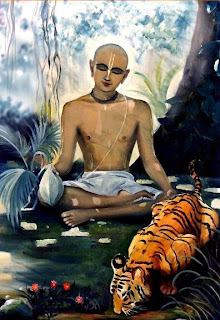As India is still receptive to direct devotional preaching and Prabhupada emphasized that, shouldn’t that be our emphasis too?
Happy Prabhupada Festival in Los Angeles Day 2 (Album 82 photos)
→ Dandavats.com
 Wonderful atmosphere for this big gathering of Srila Prabhupada's disciples still alive. Read more ›
Wonderful atmosphere for this big gathering of Srila Prabhupada's disciples still alive. Read more › Islam and Christianity have damaged Vedic culture yet we consider them revealed religions – so are they part of Kali’s plan or have they become distorted over time?
→ The Spiritual Scientist
Don’t romanticize the past or demonize the present – utilize whatever is available
→ The Spiritual Scientist
Lecture Summary:
Don’t romanticize the past:
- Overview of scriptural history: Adharma present in SB, RA, MB and even CC
- Overview of secular history: During Buddhism / Jainism’s reign in India for some 1000 yrs, more atheistic books were written in Sanskrit than in any other classical language … Battle against monism for 1000 years … Temple desecration during Islamic rule.
Don’t demonize the present:
- Rupa and Sanatana G used their political acumen to act as shock-absorbers between Islamic rulers and Vaishnava community / culture
- Bhaktivinoda T and Bhakisiddhanta S T didn’t demonize British rule or sympathize with the Independence struggle
- Prabhupada saw the spiritual spark within the hippies despite their degraded condition
Don’t insist on the traditional – use the available in devotional service
Eg. Traditional gender roles vs Prabhupada’s engaging unchaperoned women in preaching and book distribution
Eg. Divine monarchy vs today’s political reality: democracy offers the most conducive environment for practicing and sharing KC
Demonization of the present ends in de-energization of our bhakti e.g. practising bhakti in an urban environment
Don’t let criticism of the social / cultural / political / economic situation deprive people of our universal spiritual message
Prabhupada Festival in Los Angeles one of the biggest gathering of SP disciples on the planet! (Album 65 photos)
→ Dandavats.com
 Very successful program with a huge Harinama in Venice Beach. Read more ›
Very successful program with a huge Harinama in Venice Beach. Read more › Krishna Katha Day 02 by H H Bhakti Rasamrita Swami 10th Sept 2012
→ Gouranga TV - The Hare Krishna video collection
Krishna Katha Day 02 by H H Bhakti Rasamrita Swami 10th Sept 2012
Jayadevi Dasi leading New Vrindaban’s Kartik 24 Hour Kirtan – October 19th, 2013
→ New Vrindaban Brijabasi Spirit
Video of Jayadevi Dasi leading New Vrindaban’s Kartik 24 Hour Kirtan - October 19th, 2013.
Mahabharata Characters 09 – Bhishma 08 – The Grandsire on the arrow bed
→ The Spiritual Scientist
This talk is a part of the "Fascinating Mahabharata Characters" series. To know more about this course, please visit: bhakticourses.com
The different emphasis of the words “God”, “Lord” and “Krishna”
→ The Spiritual Scientist
In this first section [of the Chaitanya Shikhsamrita] the words "Lord", "God" and "Krsna" have all been used. The reader should not think that these words refer to separate entities. Krsna is the only form, the only object of worship by the soul. Krsna is the complete revelation of sweetness in God. When we consider Krsna in relation to other objects and need to emphasize his lordship, we use the word "Lord." That is why in the beginning the word "Lord" was used instead of Krsna. Lordship is nothing more than the natural control that Krsna displays towards the objects of his creation. In enumerating, the objects of existence, the word "Lord" is thus used: cit (conscious entity), acit (matter) and isvara (Lord, controller of both).
Chaitanya Shikshamrita, Bhaktivinoda Thakura
Govinda Damodara Stotra 1 – When all other shelters fall, Krishna’s shelter remains tall
→ The Spiritual Scientist
HG Narottamananda Prabhu / Kalachandji’s Bhagavad-Gītā Meditation Course – 26
→ Kalachandji's Audio Archive
HH Bhakti Visrambha Madhava Swami / SB 10.62.22-26
→ Kalachandji's Audio Archive
HG Mukunda Datta / SB 10.62.07-08
→ Kalachandji's Audio Archive
HG Narottamananda Prabhu / The Krishna Book
→ Kalachandji's Audio Archive
Mukunda Datta / The Darshan Room \ Millions of Action Seeds – BG 3.9
→ Kalachandji's Audio Archive
HG Mukunda Datta Prabhu / SB 10.62.01-06
→ Kalachandji's Audio Archive
Is there Freewill in Fate?
→ The Enquirer
Originally posted on Vic DiCara's Astrology:
“Fate” comes from Latin, where it means, “Spoken.”Like if a judge sentences a criminal, the sentencing is called a “Fatum”. The common people thought that the gods sentenced human beings to various rewards or punishments. This is a half-truth. The gods do enforce a sentence, but like a judge, they are not the origin of the need for a sentence to be passed. The criminal is the origin. Similarly the living being is the origin of the sentence declared by the gods as fate.
In short the word “Fate” should convey the understanding that the gods enforce certain results upon us, but that we are the root cause of the reward and punishment we experience.
“Destiny” also has Latin origins. “de-stinare” means to make something stable. In other words, when something is decided. Again, common people thought that the gods whimsically decided what rewards and punishments to bestow on people…
View original 157 more words
Prabhupada Letters :: Anthology 2014-05-28 01:36:00 →
"N.B. There was an incidence extraordinary. At 10 night when I was typewriting Paul became too much irritated and I stopped typewriting. It was unusual due to his abnormal condition. Better to take precaution in future."
Prabhupada Journal :: 1966
Prabhupada Letters :: Anthology 2014-05-28 01:34:00 →
Prabhupada Letters :: 1968
Prabhupada Letters :: Anthology 2014-05-28 01:31:00 →
Prabhupada Letters :: 1970
Prabhupada Letters :: Anthology 2014-05-28 01:29:00 →
Prabhupada Letters :: 1971
Prabhupada Letters :: Anthology 2014-05-28 01:26:00 →
Prabhupada Letters :: 1972
Prabhupada Letters :: Anthology 2014-05-28 01:23:00 →
Prabhupada Letters :: 1974
Prabhupada Letters :: Anthology 2014-05-28 01:22:00 →
Prabhupada Letters :: 1974
Prabhupada Letters :: Anthology 2014-05-28 01:18:00 →
Prabhupada Letters :: 1975
ISKCON Scarborough- Home program
→ ISKCON Scarborough
Pleased With Our Attempts
→ Japa Group
Rain of mercy
→ KKSBlog
(Kadamba Kanana Swami, 29 April 2014, Radhadesh, Belgium, Srimad Bhagavatam 6.4.49-50)
We must, somehow or other, connect to Krsna and that changes everything. We had this one kirtan, a Ratha Yatra actually in South Africa, in Newcastle and it was raining cats and dogs, as they say in English. When it rains cats and dogs, you can understand that it is not just a little bit. It was just raining buckets! It was not clearing up and the Ratha Yatra was postponed for an hour, but there was no hope. It just kept on pouring and pouring, so we had to go out in the rain.
 So, we went. I had to give an opening speech from the chariot which I did and I remember that I said, “You know, the rain of mercy is greater than the rain of water.” (laughter) I was trying to be positive! Say something positive and get everyone in a positive mood about it, right!
So, we went. I had to give an opening speech from the chariot which I did and I remember that I said, “You know, the rain of mercy is greater than the rain of water.” (laughter) I was trying to be positive! Say something positive and get everyone in a positive mood about it, right!
You know, we were just out there and it was raining so much, fish were swimming passed! (laughter) At one point, we just started dancing! To hell with it all and we just started dancing and it became one of the most ecstatic Ratha Yatras we ever had, just dancing like mad men because it was mad, so we got mad! We danced like mad in the rain. We would have never danced mad like that, but because of that rain, it sort of just made us mad! Everyone went berserk and it really brought out something extraordinary. So what can be said, it was a special opportunity!
So, if one takes everything as a special opportunity, a special opportunity to serve Krsna in a special way, then one can rise above this sense of austerity in life. Otherwise, the material austerity will always follow us and burden our mind.
The Walking Monk 2014-05-27 21:24:00
→ The Walking Monk
Sunday, May 25th, 2014
→ The Walking Monk
A Day in Calgary
For practical reasons, our group of four decided that a one day stay in Calgary would make sense before embarking on the long continuous trek to the destination point, the Pacific Ocean. We were already here and the Sunday Open House at the Radha Madhava Cultural Centre should be attended by us. Michael opted for visiting and attending Mennonite services at a church nearby.
At the Radha Madhava Cultural Centre, I did speak from Bhagavad-gita, Chapter 3, regarding every endeavour being a sacrifice. Otherwise, one’s actions create a kind of bondage. In other words, you function in life with the best of efforts. Being detached from the fruits, so to speak. Our best foot should be put forward. Even walking can be done, or any activity, for that matter, as an offering. In the course of your activity, you don’t seek attention for your own profit. If what you do brings what you do to an increased state of awareness, then you are on the right track. If you act in such a way that ego becomes inflated, then you can consider you’re taking several steps back.
After our time speaking, chanting and mingling, a group of us headed for the placid waters at the Jaypur Bridge on Princess Island, situated on the Bow River. Our kirtan, which included voice, harmonium, drums, karatals (cymbals), met with delight by park browsers.
In addition to this, just to keep up some foot momentum, Gaura Chandra, a local devotee, Karuna and I, took to the Calgary Greenway Trail, in the city’s northeast end. The day was full and rich.
May the Source be with you!
7 KM
Nava-vraja-mahima distribution in Budapest
→ SivaramaSwami.com
The post Nava-vraja-mahima distribution in Budapest appeared first on SivaramaSwami.com.
Prabhupada Letters :: Anthology 2014-05-27 17:26:00 →
Prabhupada Letters :: 1966
Prabhupada Letters :: Anthology 2014-05-27 17:14:00 →
Prabhupada Letters :: 1969
Prabhupada Letters :: Anthology 2014-05-27 17:13:00 →
Prabhupada Letters :: 1970
Prabhupada Letters :: Anthology 2014-05-27 17:10:00 →
Prabhupada Letters :: 1970
Prabhupada Letters :: Anthology 2014-05-27 17:08:00 →
Prabhupada Letters :: 1970
Prabhupada Letters :: Anthology 2014-05-27 16:48:00 →
Prabhupada Letters :: 1974
Prabhupada Letters :: Anthology 2014-05-27 16:46:00 →
Prabhupada Letters :: 1975
Prabhupada Letters :: Anthology 2014-05-27 16:41:00 →
Prabhupada Letters :: 1975
Advaita Hari Prabhu Memorial
→ Mayapur.com
The post Advaita Hari Prabhu Memorial appeared first on Mayapur.com.




